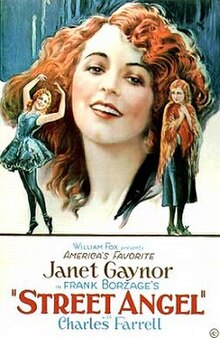Street Angel (1928 film)
| Street Angel | |
|---|---|
 Theatrical release poster | |
| Directed by | Frank Borzage |
| Written by | Philip Klein Henry Roberts Symonds Monckton Hoffe (play) |
| Produced by | William Fox |
| Starring | Janet Gaynor Charles Farrell Alberto Rabagliati |
| Distributed by | Fox Film Corporation |
Release date | April 9, 1928 |
Running time | 102 minutes |
| Country | United States |
| Languages | Silent film English intertitles |
| Box office | $1.7 million[1] |
Street Angel is a 1928 silent film with a Movietone soundtrack, directed by Frank Borzage, adapted by Harry H. Caldwell (titles), Katherine Hilliker (titles), Philip Klein, Marion Orth and Henry Roberts Symonds from the play Lady Cristilinda by Monckton Hoffe. As one of the early, transitional sound film releases, it did not include recorded dialogue, but used intertitles along with recorded sound effects and musical selections.[2]
Street Angel was one of three movies for which Janet Gaynor received an Academy Award for Best Actress in 1929; the others were F. W. Murnau's Sunrise and Borzage's 7th Heaven. Street Angel was also nominated for Best Art Direction and Best Cinematography.[3]
The acting award was given in 1929 and the other two in 1930, which accords the movie the distinction of being the only film to ever receive an Oscar nomination in two different years that was not a foreign language film.[citation needed]
Cast
- Janet Gaynor as Angela
- Charles Farrell as Gino
- Alberto Rabagliati as Policeman
- Guido Trento as Neri the Police Sergeant
- Henry Armetta as Mascetto
- Louis Liggett as Beppo
- Milton Dickinson as Bimbo
- Helena Herman as Andrea
- Natalie Kingston as Lisetta
Plot
A spirited young woman (Gaynor) finds herself involved in illegal ways of gaining money to help pay for her ill mother's medicine. She is caught in the act, runs away from punishment, and finds her mother dead. Destitute and on the streets, she joins a traveling carnival, where she meets a vagabond painter (Farrell). Though they fall in love, her past will not leave her alone.
Home video release
The film was thought lost for years, but it is now part of a 12 film collection by Fox that was released in 2008.[4]
References
- ^ "WHICH CINEMA FILMS HAVE EARNED THE MOST MONEY SINCE 1914?". The Argus. Melbourne: National Library of Australia. 4 March 1944. p. 3 Supplement: The Argus Weekend magazine. Retrieved 6 August 2012.
- ^ Steffen, James. "Street Angel (1928)". Turner Classic Movies. Retrieved 12 March 2016.
- ^ "NY Times: Street Angel". NY Times. Retrieved 2008-12-06.
- ^ "Street Angel (1928)". Retrieved September 20, 2014.
External links
- Street Angel at IMDb
- Street Angel at Virtual History
- 1928 films
- 1920s drama films
- Films featuring a Best Actress Academy Award-winning performance
- American black-and-white films
- English-language films
- Films based on works by Monckton Hoffe
- Films directed by Frank Borzage
- American drama films
- American silent feature films
- American films
- Films produced by William Fox
- Fox Film films
- Circus films
- 1920s silent drama film stubs
